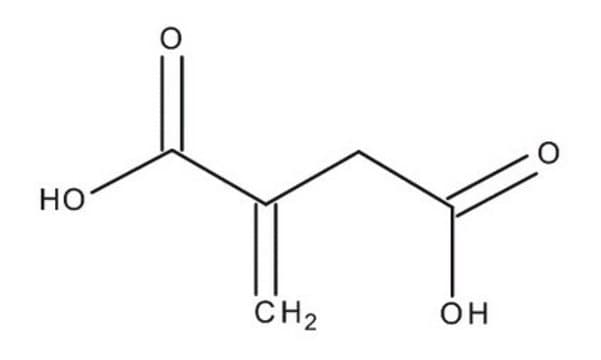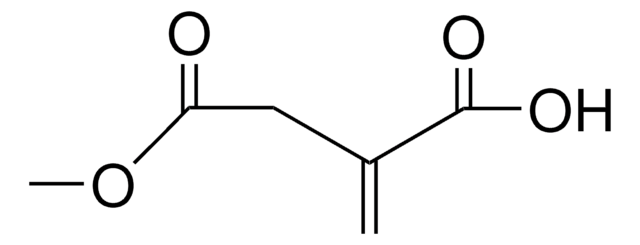I29204
Itaconic acid
≥99%
Synonym(s):
Methylenesuccinic acid
About This Item
Recommended Products
Assay
≥99%
autoignition temp.
1472 °F
mp
165-168 °C (lit.)
density
1.573 g/mL at 25 °C (lit.)
SMILES string
OC(=O)CC(=C)C(O)=O
InChI
1S/C5H6O4/c1-3(5(8)9)2-4(6)7/h1-2H2,(H,6,7)(H,8,9)
InChI key
LVHBHZANLOWSRM-UHFFFAOYSA-N
Looking for similar products? Visit Product Comparison Guide
Application
- As a comonomer in the polymerization of polyacrylonitrile (PAN) to promote the thermo-oxidative stabilization of polymer.
- In combination with acrylamide to form (poly[acrylamide-co-(itaconicacid)]) to synthesize biodegradable superabsorbent polymers.
- To synthesize biobased polyester composite in fabric industry.
Signal Word
Danger
Hazard Statements
Precautionary Statements
Hazard Classifications
Eye Dam. 1
Storage Class Code
11 - Combustible Solids
WGK
WGK 1
Personal Protective Equipment
Choose from one of the most recent versions:
Already Own This Product?
Find documentation for the products that you have recently purchased in the Document Library.
Customers Also Viewed
Articles
Our strategy is to synthesize mesoporous carbonaceous materials (“Starbons”) using mesoporous expanded starch as the precursor without the need for a templating agent.
Our team of scientists has experience in all areas of research including Life Science, Material Science, Chemical Synthesis, Chromatography, Analytical and many others.
Contact Technical Service












